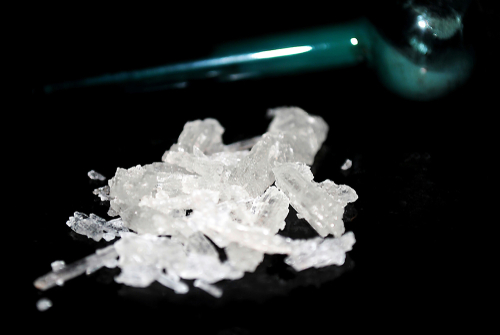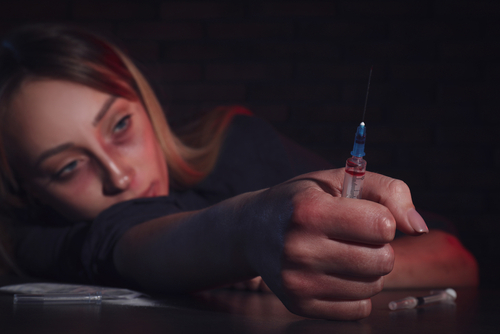If you want to know the signs someone is on meth, this is the article for you! Meth abuse can be hard to spot, especially since many of its symptoms and effects are similar to other drugs. But catching early signs of meth use can help prevent abuse from becoming a lifelong addiction.
This short blog explains what meth is, 25 signs someone is on meth, and what you can do to help a stranger or loved one in need.
What Is Meth?
Methamphetamine, also known as meth or crystal meth in its rock form, is a powerful and highly addictive stimulant. By releasing massive amounts of norepinephrine and dopamine in the brain, meth causes users to feel euphoric, energetic, invincible, and other psychoactive effects. Meth is typically snorted in powder form, smoked in rock form, or diluted and injected. Because of its pleasurable but short-term effects, and the brain’s tendency to become dependent, meth abuse can quickly lead to addiction and withdrawal symptoms if a user tries to quit.

25 Common Signs Someone Is On Meth
It’s important to note that meth can affect users differently and display a variation of these symptoms, usually due to genetics, weight, gender, and pre-existing physical and mental health conditions. Other signs of meth use include noticeable or hidden paraphernalia, such as glass pipes, burnt and bent spoons, needles and syringes, and razor blades or credit cards with residue. Here are 25 common signs someone is on meth.
Their behavior is strange:
- They’re irritable or more annoyed than usual.
- Their temper rapidly changes from erratic to withdrawn.
- They might be lying more than usual or stealing money or valuable items.
- Their relationships with other people are changing.
- They’re neglecting personal and financial responsibilities.
Their appearance is changing:
- They might be losing weight or eating less than usual.
- They’re neglecting their hygiene (showers, clothing, hair, etc.)
- Their teeth might be rotting or decaying (meth mouth).
- They might develop or have worsened acne or another skin condition due to smoking and scratching their face.
- Their arms and legs have sores, track marks, or puncture wounds from injecting meth.
- They might have tics or muscle spasms, known as “tweaking.”
- Their sleep patterns are changing.

Their cognitive abilities are changing:
- They might have poor memory or trouble recalling daily events.
- They’re confused.
- They’re disoriented.
- They make poor decisions or have poor judgment over personal or financial choices.
- They’re impulsive.
- They’re hallucinating (meth use can cause tactile hallucinations, such as meth mites).
- They’re paranoid, believing others are out to harm them.
- They’re delusional.
Their mental health is changing:
- They alternate between hypomania and depression.
- They’re upset at their actions.
- They’re agitated easily (usually when sober and craving meth).
- Their emotions change quickly.
- They have suicidal ideas or tendencies.
What Can You Do To Help Them?
Seeing a loved one struggling with meth abuse can be difficult to process and cope with, especially if they live with you and their drug abuse affects family and home life. Seeing a stranger struggling with meth abuse can also be challenging, although your ability to help them is more limited. Here are a few ways to help a loved one or stranger exhibiting signs of meth abuse.
Helping a loved one:
Helping a loved one struggling with meth abuse needs to be a sensitive approach. They’re more than their addiction, and it’s important to treat the substance use disorder as the issue rather than the person’s behavior or character. The best way to approach a loved one about their substance abuse is to go into the conversation with everything you need. Research more about meth, how it affects the brain, and the most effective treatment options. Some treatment options you can offer them include:
- Partial hospitalization programs: Day Treatment Program programs aren’t as demanding as residential programs and loved ones can attend meth addiction treatment and take care of personal responsibilities at the end of the day.
- Intensive outpatient programs: These addiction treatment programs are a step down from Day Treatment Program but offer the same treatment methods and healing modalities.
- Aftercare plans: Once your loved one leaves addiction treatment, they’ll need an aftercare plan that helps them on the road to recovery, providing ongoing substance abuse care.
- Detox centers: Meth and other addictive substances can cause users to go through withdrawal symptoms if they try to quit cold turkey. Professional detox centers can help your loved one detox from meth and reduce the severity of uncomfortable or dangerous side effects.

Helping a stranger:
We do not recommend approaching and confronting a stranger about potential meth use. It can be disheartening to see someone affected by methamphetamine abuse, but there is only so much you can do. However, you might be at a party or gathering and notice a stranger is unresponsive or has potentially overdosed on meth. Overall, you may never know when you need to offer someone assistance in a moment of crisis. So, here are some quick tips on how you can help a stranger.
- If they seem to be unresponsive or not breathing, call 911. This also applies if they show violent behavior but stress to emergency response teams that they are just struggling with meth abuse and are not intentionally seeking to hurt others.
- If they’re having a panic attack, sweating or shaking, or are having difficulty breathing, reassure them that these feelings will pass, move them to a calmer or quieter setting, and encourage slow, deep breathing.
- If they’re overheating or dehydrated, take them to a place with air conditioning or a fan, offer them cold water to sip slowly, or fan them to cool them down.
- If they’re feeling drowsy after using meth, try to keep them awake or have them walk around, call an ambulance, ensure they’re not alone, and avoid giving them coffee or startling them.
- If they’re having fits or a seizure, call 911, clear the area of dangerous objects such as needles or lighters, loosen tight clothing, cushion their head, and put them in the recovery position.
- If someone collapses after using meth, call 911 and use the DRS-ABCD approach: Check for danger, check for responsiveness, send for help, open airways, check for breathing, and perform CPR or use a defibrillator if needed.
Meth Addiction Treatment With East Coast Recovery
If you or someone you know is showing signs of meth use, contact East Coast Recovery in Boston, Massachusetts. Our addiction treatment team is well-trained in helping individuals with meth use disorders, also called stimulant use disorders. Our treatment center offers Day Treatment Program, Partial Day Treatment Program, medication-assisted treatment (MAT), and more. We also offer various therapy methods and healing modalities, including adventure therapy, experiential therapy, meditation, and breathwork.










